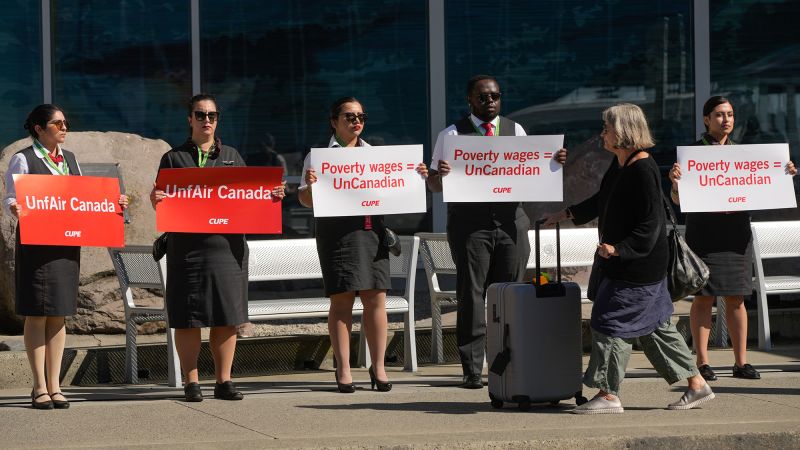Air Canada, the largest airline in Canada, is taking significant steps ahead of an impending lockout of its flight attendants, raising concerns of widespread travel disruption during a peak period. Starting Thursday, Air Canada will begin to cancel several dozen flights, with operations gradually winding down over the next three days. The final blow will come on Saturday when a complete halt of all Air Canada and Air Canada Rouge flights is anticipated, coinciding with the scheduled lockout initiated after the flight attendants’ union voted overwhelmingly to strike earlier this week.
The impending cancellations appear poised to have considerable ripple effects throughout the air travel industry. Air Canada holds a substantial stake in the market, making its operational decisions influential not only within its domestic framework but also across international travel and US-bound flights. The airline acknowledged that halted operations could last longer than expected; even if negotiations with the union progress swiftly, a complete restart of services could take as long as a week after the lockout begins.
During a recent press conference, Air Canada executives addressed the situation, emphasizing the urgency of the matter. The union representing the flight attendants showcased their discontent silently, brandishing signs such as “Unfair Canada” and “Poverty wages = UnCanadian,” driving home the emotional stakes of the dispute. According to Air Canada, the potential impact of flight cancellations could reach approximately 130,000 passengers daily, amounting to an enormous logistical challenge.
This includes a notable number of Canadians, around 25,000, who rely on Air Canada for flights returning from abroad each day, potentially making them stranded if these flights do not continue. The Canadian Union of Public Employees, representing the flight attendants, had issued a strike notice that led to Air Canada’s 72-hour lockout warning set to take effect from August 16. With a staggering 99.7% of union members voting in favor of striking, the airline faces significant workforce challenges.
Arielle Meloul-Wechsler, Air Canada’s executive vice president, expressed disappointment toward the union’s actions, stating they could potentially disrupt hundreds of thousands of travelers’ plans. She reiterated that the circumstances were preventable and that the airline remains willing to negotiate further. Air Canada announced plans to attempt rebooking affected passengers onto competing airlines to mitigate disruptions. However, during peak travel periods, the availability of seats is limited, making this a significant logistical challenge for the airline.
Morning reports from aviation analytics firm Cirium indicated the cancellation of 15 domestic flights at the time, but further cancellations were expected in the days to come. Mark Nasr, Air Canada’s executive vice president, stressed that the airline’s operations are complex, and stopping and restarting services is not a straightforward task.
International travel from Canada, especially from the US, will also feel the strain due to Air Canada’s extensive daily flights. The airline operates around 430 flights between Canada and the US, contributing significantly to the cross-border passenger flow. They are coordinating with other carriers within the Star Alliance, which includes major airlines like United and Lufthansa, to facilitate alternate accommodations for displaced travelers amid the challenges presented by the busy summer season.
The ongoing negotiations have proven difficult, with issues surrounding pay and unpaid work at the center of the conflict. The union argues that their members are not compensated for work performed outside of flying hours, leading to prolonged discussions over fair wages. Wesley Lesosky, president of the Air Canada Component of the Canadian Union of Public Employees, stated that they have submitted detailed proposals advocating for industry-standard compensation.
Despite Air Canada’s efforts to provide fair compensation — including a proposal for a 38% increase over four years — the union has deemed these offers inadequate. The standoff has raised questions regarding the duration of the lockout, with historical data showing that prior employee protests have sometimes resulted in operational halts.
Canadian Minister of Jobs and Families Patty Hajdu has voiced her disappointment regarding the current situation, urging both parties to negotiate and resolve their differences. As the threat of travel disruptions looms, the pressure for a resolution intensifies, emphasizing the broader implications for travelers on both sides of the border who rely on Air Canada for their travel plans.












